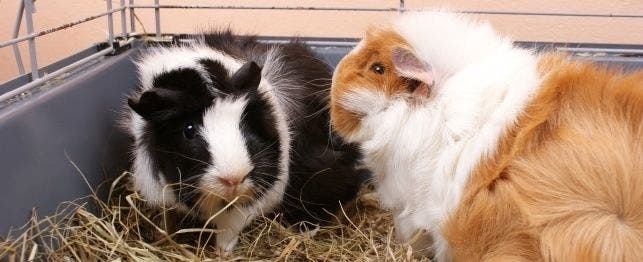
Vitamin C Deficiency (Scurvy) in Guinea Pigs
Vitamin C, also known as ascorbic acid, is one of several important vitamins crucial to maintaining health. For people, guinea pigs and a few other species, this vitamin C must be ingested. Other animals are able to produce natural vitamin C and do not require a consistent outside source.
Ascorbic acid is essential in a variety of chemical reactions necessary for a normal metabolism. It is also essential in the development of normal collagen, a connective tissue important in body functions. If guinea pigs do not get an outside source of vitamin C, a serious illness called scurvy will develop.
What to Watch For
- Weakness
- Lethargy
- Loss of appetite.
- Swollen, painful joints
- Vocalization or crying when handled
- Rough hair coat
- Diarrhea
- Weight loss
- Discharge for eyes or nose
Young growing guinea pigs may develop bone deformities.
Diagnosis
Diagnosing scurvy can be tricky. The signs are vague and can indicate a variety of illnesses. However, joint stiffness is one of the key signs of scurvy. Many veterinarians feel that any ill guinea pig should be supplemented with extra vitamin C, even if scurvy is not suspected.
Treatment
The treatment for scurvy is the administration of vitamin C. If treated early enough, most of the signs of scurvy can be alleviated. Vitamin C can be added to water or food, but in serious cases, vitamin C may need to be given as an injection. For a normal health guinea pig, 5 to 10 mg per kilogram of body weight of vitamin C is needed every day. For guinea pigs deficient in vitamin C, 30 mg per kilogram of body weight of vitamin C is needed until the signs of scurvy are gone. Usually, recovery takes about 1 week. Once the guinea pig has recovered, a maintenance dose of vitamin C is administered.
Home Care and Prevention
Though it may be tempting to do so, do not give your guinea pig multivitamins. The potential for toxic overdose of other vitamins is too risky. The most important part of vitamin C deficiency is to prevent it. By offering your guinea pig a proper supplemented diet, scurvy can be avoided.
Vitamin C is not a very stable vitamin. Many people add vitamin C to the guinea pig’s water bottle. Since the vitamin is easily broken down by light, the water bottle must be covered with a sock or foil. Each day, a new batch of water and vitamin C must be offered. In addition to supplementing the water, guinea pig pellets have vitamin C added. Make sure you feed guinea pig pellets and not pellets for any other type of animal. The other species do not require extra vitamin C and their diets are too deficient for your guinea pig.
After you have purchased your guinea pig pellets, make sure to store the package in a cool dark place. Also, be aware that the vitamin C in the pellets degrades over time. Try to feed only pellets that are within 90 days of milling. Fortunately, newer irradiated diets have a longer shelf life but pellets should be used within 4 to 6 months. If your pellets are old, toss them out and get a fresh supply.
Various fruits and vegetables also offer this essential vitamin. Guava, orange with the peel, parsley, broccoli, kale and mustard greens have enough vitamin C to make them good choices for treats.
By providing the proper amount of vitamin C, you and your guinea pig can have many happy years together.